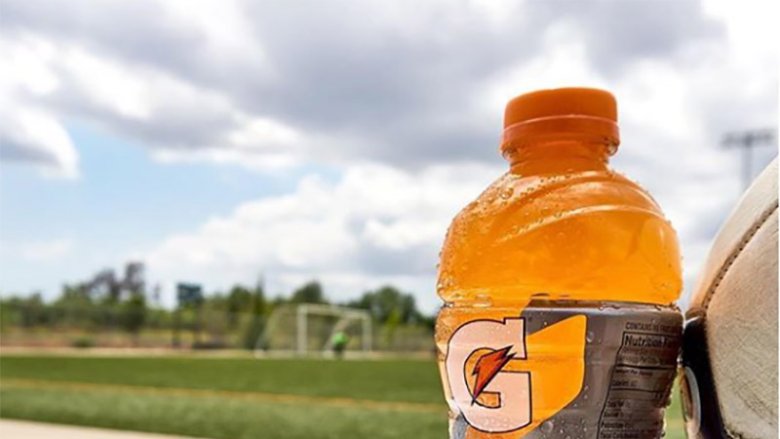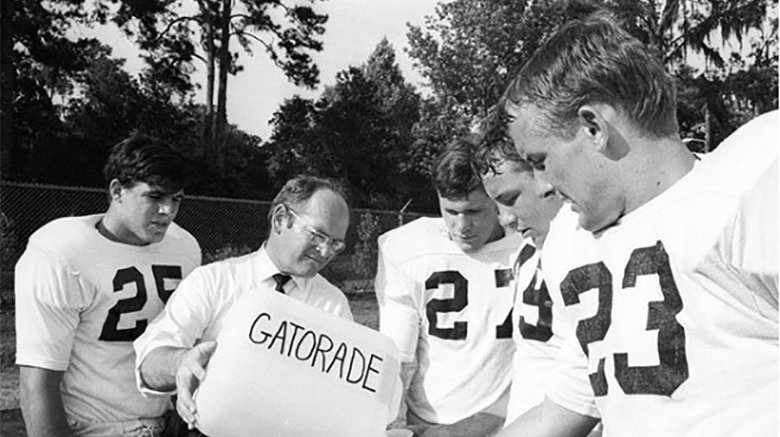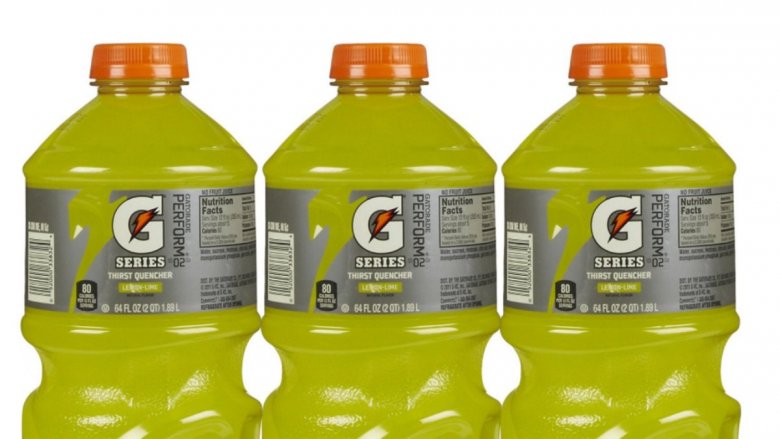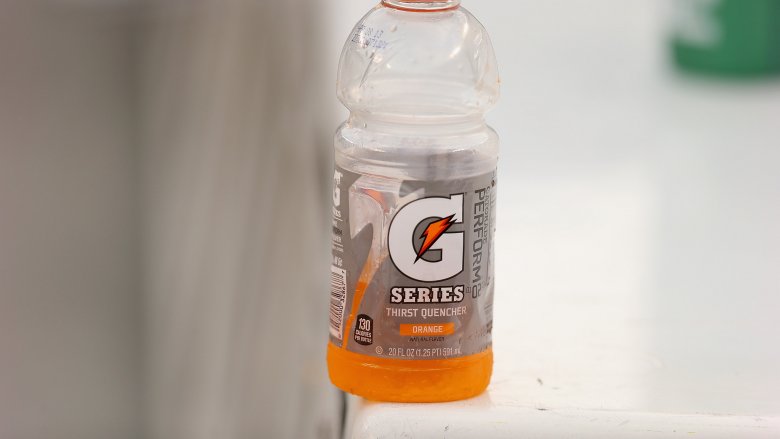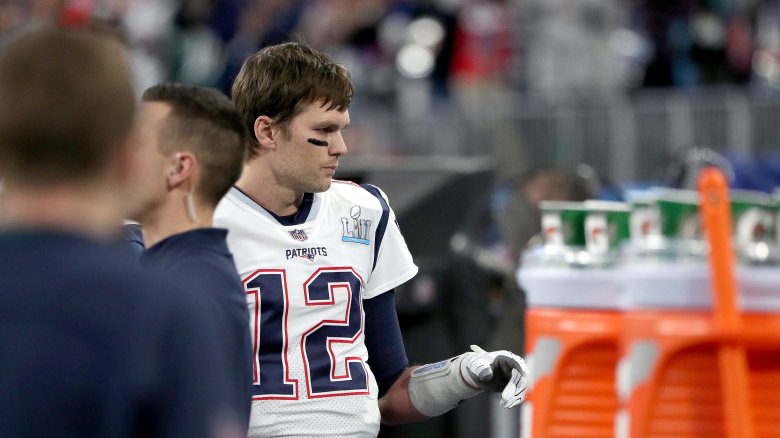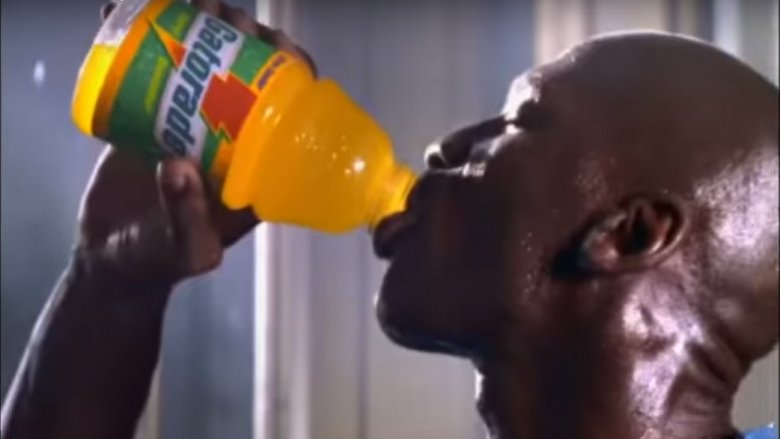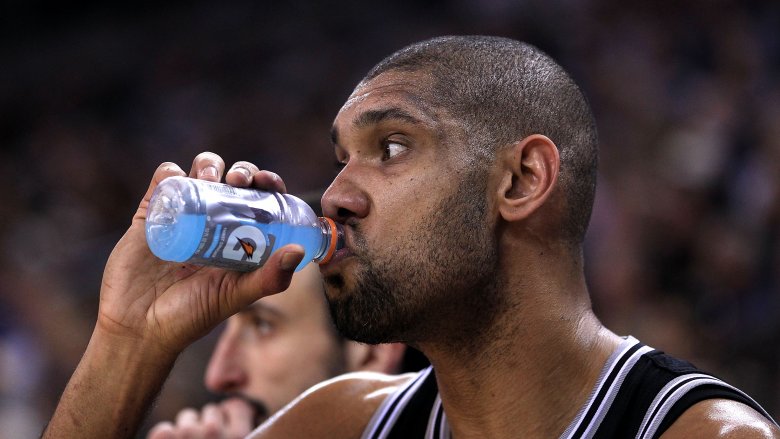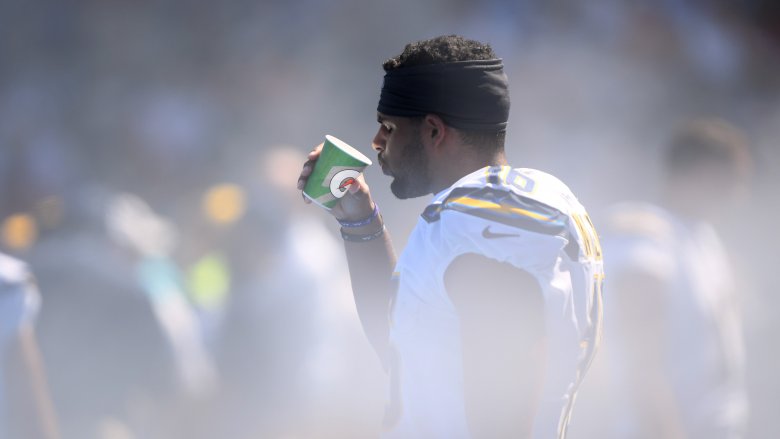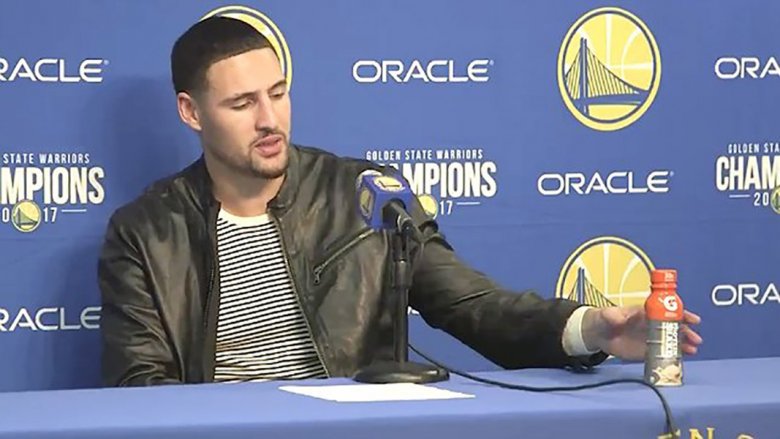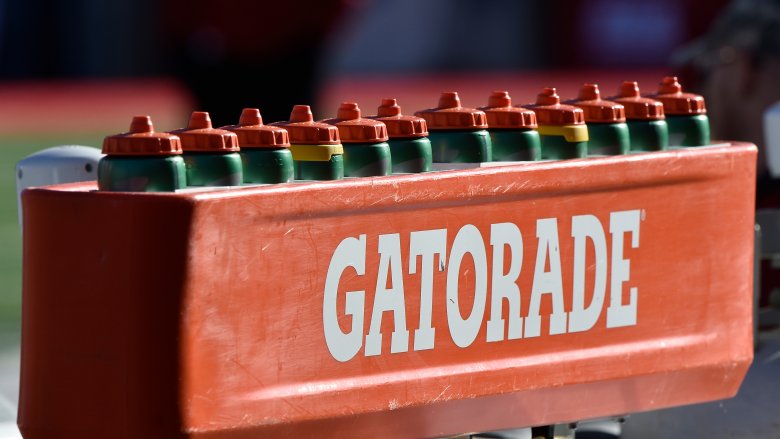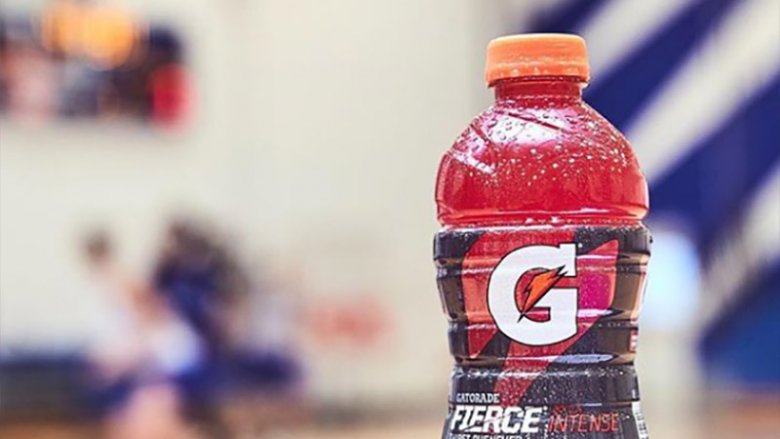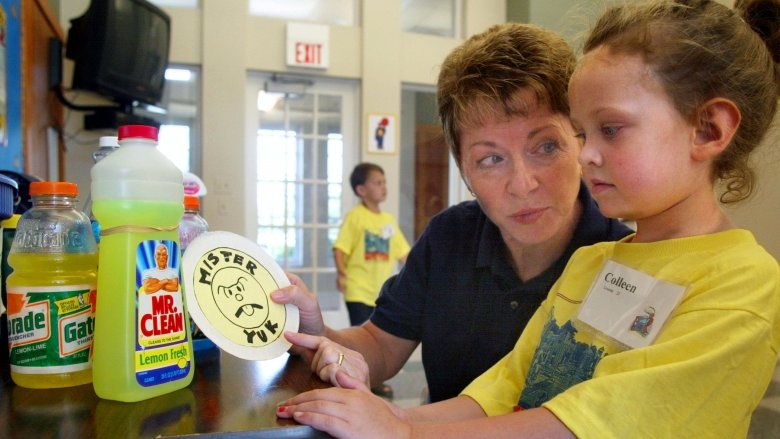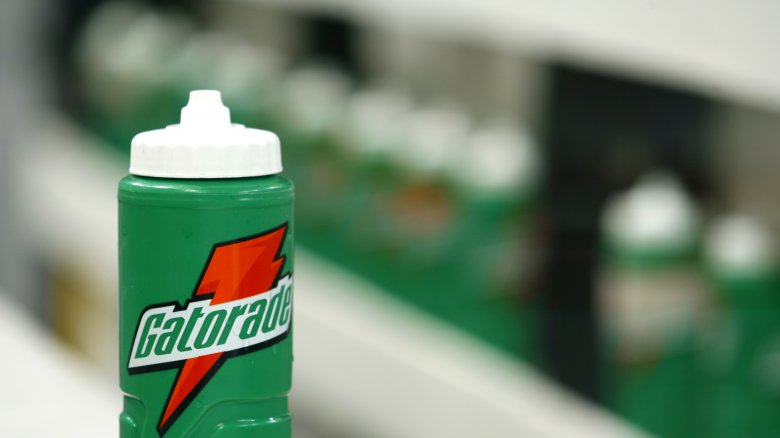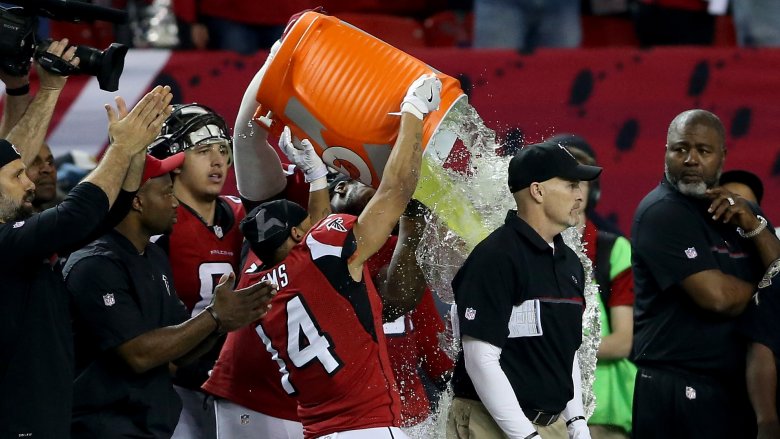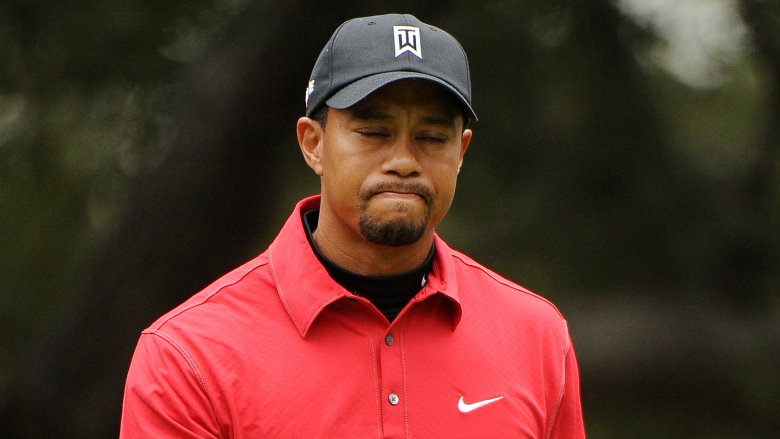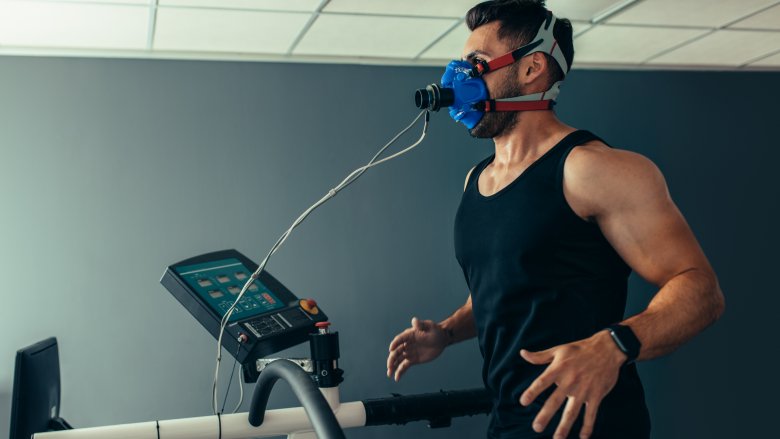The Untold Truth Of Gatorade
We may receive a commission on purchases made from links.
Even if you've never so much as tossed a football in your life, we'd be willing to bet that you've probably still tried Gatorade at least once — and we know you've seen it around. It's nearly impossible to watch a sports game without seeing the Gatorade logo hiding somewhere in the background. The reason for this is because Gatorade is the dominating sports energy drink, controlling nearly 70 percent of the market in 2013. From pro-baseball to soccer and NASCAR, it's in every major American sport.
The drink has certainly come a long way from its humble beginnings at the University of Florida (named for the Florida Gators of course) in 1965. These days, just about every big shot pro athlete from Derek Jeter to Serena Williams has teamed up with the beverage company's marketing department. Gatorade's rise to sports drink world domination hasn't come without a some controversy along the way though. Here's everything you didn't know about that neon-colored drink from the sunshine state.
It used to be really gross
These days you can get Gatorade in a number of tasty flavors. Back in Gatorade's early days, however, that definitely wasn't the case and it tasted pretty darn gross. When Dr. Robert Cade was first developing the drink down in Gainesville, Florida it was mostly made of water, fructose, sodium citrate, and monopotassium. Mmmm, right? Not hardly. The drink reportedly tasted so bad that some athletes vomited after drinking it.
Cade was a physician specializing in nephrology and was focused on the kidneys, not taste. The hurdle that he had to overcome wasn't just finding a way for his new drink to replenish the body with electrolytes, but to do so in a way that athletes could stomach during a hot day on the football field. While he could have taken the concoction to an already existing beverage company and had them find a way to make it taste better, Cade decided to do it himself in a very odd way.
The inventor did some weird stuff
So the early Gatorade prototype was straight barf-fuel and players told the well-meaning doctor that his drink tasted like toilet bowl cleaner and even worse, urine. If one ever needed proof that Dr. Cade was willing to go above and beyond to make his new sports drink drinkable, they only need look to his next move. Dr. Cade took the athletes' criticisms to heart and taste tested his Gatorade against a bottle of urine. He came to the conclusion that the players were right on the money .
The next step was finding a way to make Gatorade not taste like a bottle of pee and it was Cade's wife who had the answer. Mrs. Cade suggested that he add some lemon juice to the mix to cut the harsh taste, and after some tweaking, Cade had a drinkable Gatorade formula. "She said add lemon juice and cyclamate because that usually covers up any bad taste," Cade said. So that's what we did.” Way to go, Mrs. Cade!
It might be more harmful than it is healthy
Vintage ads of Gatorade imply that it's the beverage choice of winners, great for kids, and even superior to water. While chugging a bottle of Gatorade during a football game is going to be a slightly better choice than soda, not everything about it is doing your body good.
The whole idea behind sports drinks is that they replenish your body with electrolytes which are needed for proper nerve, muscle, and brain function. It's the added electrolytes and carbs for energy in Gatorade that are the selling point of the drink.
The downside to Gatorade is that it does contain a lot of sugar, as much as 34 grams in a 20-ounce bottle. That might be fine if you're running up and down a football field for three hours, but not so good if you're sitting at home watching Netflix. It also contains various food dyes like Red 40 and Yellow 5 which have been linked to health risks such as cancer.
Many athletes avoid drinking it
As visible as Gatorade is in sports, you would think that every athlete would have a bottle of it in their hand every waking moment. That's not the case at all, and many athletes try to avoid drinking it. Gary Fisher, a legend in mountain biking, argues that "engineered nutrition" products can easily work against an athlete and cause them to put on unnecessary weight. "I see guys who really put in the miles, and they have a gut that never goes away," Fisher said. Sports nutrition doctor Timothy Noakes said that he advises athletes to listen to their bodies and hydrate with water whenever they feel thirsty.
As much as Gatorade would like to say they've fueled Tom Brady to five Super Bowl wins, that's just not the case and you'll never see him chugging the stuff. Sure, whatever he's drinking on the sidelines may be in a Gatorade cup or bottle, but it's actually a special concoction made just for him. "I have this lemon drink with a ton of electrolytes in it," Brady revealed. "It doesn't have any sugar."
It got a huge boost from Michael Jordan
Prior to 1991, Gatorade was just another flavored drink. Then, in August 1991, a commercial ran with Michael Jordan drinking the stuff and it became the drink of the biggest sports star on the planet. Gatorade was then owned by Quaker Oats and the company shelled out $13.5 million to Jordan in a deal that promised he would be the only person to endorse the beverage.
Jordan had previously done marketing spots for Coke, but the soda giant didn't want to give him a 10-year deal, so Gatorade came knocking. Using the Jungle Book film's "I Want to be Like You" song for inspiration, the commercial featured Jordan doing lots of hoops action, hanging out with kids, and of course, plenty of thirst-quenching Gatorade footage. The "Be Like Mike" tag line drove home the message that Gatorade was liquid fuel for the star athlete. Ads proclaimed that it worked 30 percent faster than water and helped the star beat the flu in the 1997 NBA finals.
Despite health groups slamming the advertising and a partnership that's been over since 2001, Jordan and Gatorade have continued to capitalize on the marketing campaign. In 2017, Nike proclaimed again that kids and teens could "Be Like Mike" with Gatorade inspired Jordan sneakers.
It's the only non-water drink allowed on NBA benches
Watch any NBA game or just look through a few photos of players on the bench and you're sure to see a jug of the stuff in the background. That's because it's the only drink besides water allowed on NBA benches during games. According to the Wall Street Journal (via Deadspin), Gatorade reportedly pays $18 million a year to keep it that way.
The company doesn't take it well when people question the power of its drink to fuel NBA players either. In 2014, somebody tweeted to Gatorade asking why LeBron James (who has an endorsement deal with Powerade) had leg cramps. Gatorade's response? "The person cramping wasn't our client. Our athletes can take the heat." Ouch. They could have left it at that but went on to tweet "We were waiting on the sidelines but he prefers to drink something else."
Gatorade immediately caught some backlash from fans over the social media blunder —especially since James was drinking the only beverage allowed on the court — Gatorade. They issued an apology saying they "got caught up heat of the battle."
It's also an NFL money-making juggernaut
What started as a $25,000 deal in 1968, eventually morphed into Gatorade becoming the official sports drink of the NFL in 1983. Today, that partnership has ballooned in size to an eye-popping $2.3 billion contract between the NFL and Gatorade.
The NFL is making some serious bank with Gatorade paying the sports league $45 million annually, plus $16 million a year in marketing commitments, and $1.2 million per year to make sure players are guzzling the stuff every chance they get during games.
With all that money tied up in the NFL, one would think that viewers would turn on the game and be bombarded with Gatorade logos in every corner of the TV screen, but that's not the case. Gatorade's senior vice president for sports marketing, Tom Fox, said the company knows it has "the most valuable real estate in sports" regarding their deal with the NFL and is careful not to overdo it with too much product placement. For example, it's up to each team's trainers to decide just how many jugs of the drink they want on their benches. That could also be to cut down on the number of Gatorade showers, just saying.
It conflicts with a lot of endorsement deals
Gatorade may be the official drink sponsor of the NFL, NBA, and a host of other pro leagues, but that doesn't mean it's the official sponsor of every athlete. Many athletes have their own drink deals with other sports and energy drink brands. Bringing Gatorade into the picture can sometimes make things a little messy. Take Golden State Warriors player Klay Thompson, for example. Thompson has his own deal with a sports drink made by BODYARMOR and has gone so far as to knock bottles of Gatorade off the table during press conferences. His disapproval of the beverage even spawned the hashtag #KlayHatesGatorade on Twitter.
According to ESPN, many athletes, particularly in the NBA, opt for other drinks in the locker room, but hold back on dropping any product names because of Gatorade's contract with the league. One reason writer Darren Rovell suspects many athletes choose other sports drinks is the inclusion of protein, which is completely lacking from Gatorade.
California sued them for bad-mouthing water
It's probably safe to assume that just about every doctor on the planet would stay it's monumentally stupid for a flavored drink company to bad-mouth water, but that's exactly what Gatorade did in 2012.
The mobile game Bolt! featured an Usain Bolt character who would run and jump over various obstacles and keep himself energized with Gatorade, all while avoiding performance-harming water. Yep, Gatorade was talking smack about water to children and the state of California was having none of it.
The California attorney general's office brought a lawsuit against the drink company, arguing that it inaccurately depicted water in a negative way. "Making misleading statements is a violation of California law," read a statement from California attorney general Xavier Becerra. "But making misleading statements aimed at our children is beyond unlawful, it's morally wrong and a betrayal of trust."
The game won a mobile advertising award, but any sense of accomplishment evaporated immediately when Gatorade had to pay $300,000 in a settlement. Out of that money, $120,000 went directly to educating kids that water wasn't some evil drink to be avoided.
Consumer pressure led to the removal of a controversial ingredient
No amount of spin can really make the words "flame retardant" in a drink sound like a good thing. In 2013, Gatorade's parent company, PepsiCo Inc., announced it would be taking a controversial ingredient out of Gatorade after the company's spokesperson said they'd been "hearing rumblings" from concerned consumers.
The ingredient under the spotlight was brominated vegetable oil (BVO) which PepsiCo Inc. said was used to make sure flavor was spread evenly throughout the drink. Although BVO doesn't go against any laws set by the Food and Drug Administration it's been linked to everything from neurological impairment and reduced fertility to changes in thyroid hormones and early puberty.
None of this sat well with Sarah Kavanagh, a teenager who spearheaded an online petition in 2012 for the removal of the ingredient. PepsiCo Inc. Inc said the petition had no impact on the decision, but with over 200,000 signatures that sort of call to action is hard to ignore.
There's a movement to push it out of schools
With the United States battling a childhood obesity epidemic, it's not really a surprise that there's a push to boot Gatorade out of public schools. Like we've mentioned, it's not exactly a beverage low in sugar and some states are taking notice.
Senator Tom Harkin (D-Iowa) appears to have started the push back over a decade ago when he advocated for a bill that would put government restrictions on drinks and food sold in public schools. Naturally, PepsiCo Inc. was opposed to the idea, and it worked out for them because Gatorade didn't get the ax. "If the beverage industry is serious about the health of our kids, as it repeatedly claims to be, science and sound health should be the guiding principle," Harkin said. In 2010, a bill was introduced in California to ban the sale of the drink during school hours. The California Medical Association praised the move and it won the support of then-Governor Arnold Schwarzenegger, eventually passing in a key vote.
While schools across the country may not have taken away the welcome mat for Gatorade just yet, that day could be on the horizon.
There was once an alcoholic version of the drink
All Gatorade these days is non-alcoholic, but in the early 1970s there was a version of the lemon-lime flavored drink that reportedly had 25 percent more alcohol than beer. The powerful stuff called Hop'n Gator didn't stick around long though. Gatorade inventor Dr. Robert Cade sold his recipe to the Pittsburgh Brewing Company, which didn't go over well with Gatorade, who sued him. Unfortunately, that wasn't the only trouble brewing for Hop'n Gator at the time.
The beverage came in three flavors and after at New York Times piece said that it was especially popular with African-Americans and Hispanics, the NAACP took a closer look at the product. The NAACP went after the makers of Hop'n Gator for promoting a drink to the black community but not hiring African-American workers. The legal pressure and criticism was apparently too much trouble for Pittsburgh Brewing Company and Hop'n Gator was gone by the mid-1970s.
It made a very brief return in 2004, but if you want any booze in your Gatorade these days you'll have to add it yourself.
The Gatorade shower has become a sports tradition
If you're a winning football coach, then you had better get comfortable with the idea of having icy cold Gatorade dumped on you. It's been a tradition in sports that goes back to the iconic 1980s football team the Chicago Bears.
The first account of a Gatorade shower goes to Chicago Bears' Dan Hampton, Steve McMichael, and Mike Singletary, who drenched coach Mike Ditka after beating the Minnesota Vikings during the 1984 season.
Most Gatorade historians (if there is such a thing) seem to agree, however, that it was New York Giants defensive tackle Jim Burt who truly popularized the Gatorade shower in 1985. Coach Bill Parcells had been hammering Burt throughout a game against the Washington Redskins and Burt playfully retaliated with the dunking after his team emerged victorious 17-3. The showers continued on throughout the Giants' Super Bowl-winning season.
Gatorade of course loved the free publicity. The company's then-head of sports marketing, Bill Schmidt, reportedly said "I think I've died and gone to heaven," after hearing John Madden describe the shower during a Giants playoffs game.
Tiger Woods cost the company big money — but not for the reason you think
In late 2009, news broke of Tiger Woods' numerous extramarital affairs and many of his sponsors ran for hills. It was reported that the sponsors lost close to a collective $12 billion and among those was Gatorade. Except Gatorade claimed Woods' sex scandal had nothing to due with their deal falling apart. It was more about the lack of popularity regarding his signature drink.
In March of 2008, Gatorade unveiled its drink called "Tiger Focus" and well, it wasn't exactly a hot product in the golf world. Sales of the drink were down 30 percent in 2009 and it only accounted for four percent of the company's volume. A week after Woods made a public apology regarding his affairs, Gatorade said they no longer had a deal with the golfer, but said it had nothing to do with the bad press.
It was first reported that Tiger Focus would be discontinued on November 25, two days before the incident at Woods' home that led to the unraveling of his life. More so, the editor of Beverage Digest who reported the cancellation of Tiger Focus said he first learned of the decision to end the beverage on November 9.
Whether or not Gatorade planned to work with Woods as a client after axing is drink is uncertain, but the sex scandal definitely didn't help the business relationship.
The company's science lab is constantly tweaking the product
Gatorade has come a long way from its early days at the University of Florida. It's had at least 25 different flavors and as we mentioned above, it certainly tastes a lot better than it used to.
Many of the tweaks made to Gatorade in the years since it was launched have come about the Gatorade Sports Science Institute in Bradenton, Florida. No, we're not joking, Gatorade has its own sports science lab where it's been tinkering away at the drink since 1985. According to the GSSI website, scientists study "the effects of exercise, the environment and nutrition on the human body using the latest scientific technology and equipment in the physiology, biochemistry and exercise sensory/hedonic response labs."
While all of that certainly sounds impressive, what's really coming out of this sports drink science lab? Well, besides zero-sugar drinks and flavors like Blackberry Wave, GSSI developed an in-car hydration system for race car drivers. After all, it's kinda hard to win a race when you're taking your hands off the wheel to sip some lemon-lime.
